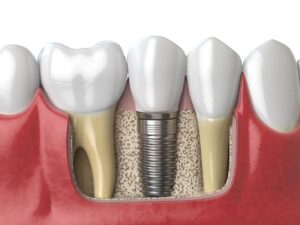Dental implants are fixed dental structures that replace missing teeth. They offer comprehensive, reliable, durable restorative benefits to those suffering from complications in the wake of tooth loss. Though the advantages seem clear, some patients worry about the invasive, extensive process involved with this dental solution.
You can feel more confident pursuing this treatment when you know what will occur during each step, including the recovery. Your dentist will give you details about your specific case during a dental consultation. But in the meantime, you can read on to learn what to expect from the treatment process of replacing missing teeth through implant dentistry.

Do Dental Implants Hurt?
A major reason people will feel apprehensive about undergoing dental work is the anticipation of pain in the dentist’s chair. You can feel at ease knowing that modern dentistry prioritizes patient comfort during dental procedures, including dental implants.
The first procedure of this treatment involves oral surgery to place titanium post anchors into the jaw. You will receive a local anesthetic to numb the affected area so that you will not feel pain. And your dentist can also give you dental sedation to induce a calming feeling through the procedure.
As you recover at home, your mouth might feel sore. Your dentist will give you pain management advice to minimize your discomfort. If you do feel severe pain, call your dentist as this is abnormal and could point to a complication requiring urgent care.
When you return to your dentist once healed, you will receive your custom dental prosthetics. This process will not hurt either, though it may feel strange at first to have new fixtures in your mouth. Your dentist will provide you with aftercare tips to ensure you will not experience pain.
How Long Does Dental Implant Treatment and Recovery Take?
Implant dentistry involves a multi-step process that can mean three or more appointments at your dentist’s office over the course of several months. You will first have a consultation appointment with your dentist to confirm dental implants will be the right treatment for your smile.
Then you will have the anchor placement surgery which will take six months or more to fully heal. After this, you will receive permanent prosthetic teeth during another dental procedure. You may also need to attend follow-up appointments at your dentist’s office to ensure the tooth replacement goes smoothly.
What Benefits Can I Expect from Dental Implants?
Dental implants will replace missing teeth both above and below the gumline, offering a variety of protections from complications of tooth loss. For instance, the anchors will reach the jawbone, stimulating it and stopping bone from deteriorating. This will keep your facial and dental structure from altering and sagging.
Implants will also allow you to perform oral functions without stressing about devices slipping out of place. You can chew and speak normally once more. And you can see gaps in your smile filled with beautiful, custom prosthetics. Then you can feel proud of the look of your smile again. These advantages can last a lifetime with proper care.

